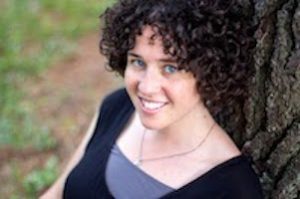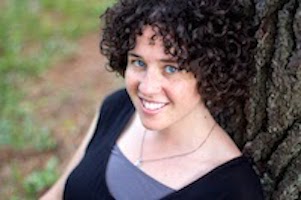Becoming Shomrei Adamah: Guardians of the Earth
This week’s post is by Arielle Aronoff, Teva’s Lead Educator and Camp Teva Manager.
As Rabbi Sid lays out in the opening chapter of Jewish Megatrends, people are searching for deeper 
meaning and connection in their lives. Teva, a program of Hazon, offers a model of intentional community, kehilla, and developing sacred purpose, kedusha, through nature connection and a framework of becoming shomrei adamah, guardians of the earth. Teva works to fundamentally transform Jewish education through experiential learning that fosters Jewish ecological and food sustainability. We do this with a focus on two distinct groups: educators typically in their 20s and 30s; and students, typically in 5th, 6th, and 7th grade from Jewish day schools.
I will begin with my focus on Teva educators. For three months, they live and work together at Isabella
Freedman Jewish Retreat Center in rural Connecticut. The first three weeks are job training on educational pedagogy, ecology, Jewish thought and practice, climate change science and solutions, song leading, behavior management, wilderness skills and first aid. As important as these lessons are to impart on new educators, the very first thing we do is enter the forest for a 3-night camping trip with the goal of developing community and immersing in the outdoors. Over the course of four days, educators learn to work together, to cook meals over the fire, gather water and fire wood, hang our food in trees to protect it from bears, raccoons and any other animals who might want an easy snack. We sing songs and share stories around the campfire. This community bonding is central to our Teva culture. We are learning to develop deep relationships with one another, our environment, and Spirit.
Through the camping trip and all aspects of training, we are also learning a shared vocabulary and developing a sense of sacred purpose. This is accomplished by deepening our awareness and love for the Earth. Naturalist and educator John Muir Laws says, “A useful definition of love is sustained compassionate attention”. In this way, we teach educators, who in turn teach children, to love the natural world by opening our awareness to observe our surroundings with every one of our senses. Drawing from Jewish wisdom we see the Kabbalists and Hasidim were well aware of this. Rabbi Nachman, for example, taught the practice of hitbodedut, going outside to speak out loud in your native language to God. R. Nachman had a prayer: “May it be my custom to go outdoors each day among the trees and grass – among all growing things and there may I be alone, and enter into prayer, to talk with the One to whom I belong.”
What is not mentioned in the propositions of Jewish Megatrends is humanity’s growing distance from the cycles of the natural world. We have engineered buildings, transportation systems, and communication devices that allow us to go about our lives without spending any significant time outside. This distance from natures’ cycles has consequences. We are currently facing a climate crisis. Humans have created an imbalance in the natural cycle. In nature, the outputs of one system become the inputs of another. There is no such thing as garbage; this is a human invention. A core tenant of Teva is interconnectedness. When we learn the ecology of our local landscape and how that locale is a part of a regional and global system, we can learn to take responsibility for our actions and become Shomrei Adamah, Guardians of the Earth.
As they develop a sense of interconnectedness to each other and the natural world, educators take this energy and knowledge into their work with students. We offer the opportunity to see beyond the paradigm set out at school. Pre-teen, pre-B’nai Mitzvah years, is a time ripe for discovering the self. This is a key time to engage youth in a Judaism that they can hold onto and access deeper meaning through. At Teva, we breathe life into the words of our texts and draw out the connections of Torah teachings such as tzar baalei chaim, kindness towards animals, when we teach how to interact with frogs and salamanders in the forest. During tefilah, prayer, each morning, we sing psalm 150, “praise God with harp and lute”, and bring out instruments to embody and enrich our prayers.
Educators set an example, drawing from the work of community building, developing sacred purpose, and becoming shomrei adamah, of how we work and play together, be silly, open to joy, and explore the forest with renewed interest and awareness every day. We provide an avenue for young people to break out of the boxes they are put into over the course of their young lives. We think it is healthy for young people to find their own voices and shape their own identities instead of constructing boundaries based on what they think society want them to be.
In this work, I am aware that we are all part of an ever-evolving, spiralling thread of time and connection. We are not the first generation to do this. Fall 2019 marked Teva’s 25th anniversary. Amy Metzer founded Teva in 1992, building on a growing movement of eco-Jewish thought and programming. We continue to build on the incredible creativity and on the explorations of those who came before us.
The sages of the Talmud radically redefined Jewish practice. Soon after the Temple was destroyed, the rabbis sought to redefine Judaism from one of worship through daily sacrifices to one of prayer. Starting in the 19th century, the Reform movement radically redefined Jewish practice so that Jews could acculturate into a primarily Christian society. Each new avenue of Jewish thought and practice opens pathways for the next generation to create side trails, yet undiscovered.
Teva is part of an ever-growing web of Jewish organizations helping their participants lead lives of sacred purpose, kedusha, through a framework of guardians of the earth, shomrei adamah, while forming community, kehillah. As we move into this new decade and a new era of Jewish life, these organizations are models of how to engage Jews in thoughtful, earth-centered, meaningful practice.
Arielle Aronoff is Teva’s Lead Educator and Camp Teva Manager. She is an avid sourdough bread baker and outdoor explorer. Arielle is a student of the Kohenet Hebrew Priestess Institute and a life-long learner of how to be a positive member of the ecosystem.


